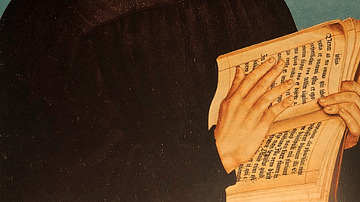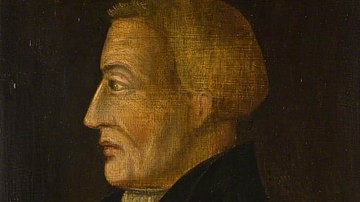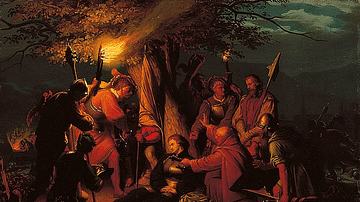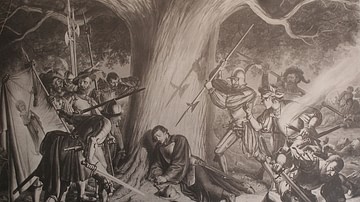Huldrych Zwingli (l. 1484-1531) wrote his 67 Articles in 1523 as a confession of faith to be presented at the First Disputation in Zürich where he defended his beliefs against accusations of heresy by the Catholic Church. Zwingli's 67 Articles are often cited with Martin Luther's 95 Theses as among the most important of the early Protestant Reformation.
Martin Luther (l. 1483-1546) had issued his 95 Theses on 31 October 1517, and although Zwingli later claimed he had not read Luther when he began his efforts at reform in 1519, there are so many similarities that many modern-day scholars believe the earlier document influenced the latter. Scholar Diarmaid MacCulloch, for example, cites the historian Euan Cameron commenting:
If Zwingli really did develop the distinctively "Reformation" message of salvation by free forgiveness, apprehended through faith, simultaneously but entirely independently of Luther, it was the most breathtaking coincidence of the sixteenth century. (138)
Although Zwingli's overall vision may have been influenced by Luther's, his 67 Articles differ significantly from the 95 Theses. Luther's work focused on the policy of selling indulgences – writs alleged by the Church to lessen one's time in purgatory – while Zwingli's Articles address a number of issues he saw as evidence of a corrupt and fallen Church. He advocated for a return to the simplicity of early Christianity depicted in the biblical Book of Acts and, like Luther, denounced any traditions of policies that were not clearly established in scripture.
When the two men later met at the Marburg Colloquy in 1529, Luther treated Zwingli poorly, and it is understood that, afterward, Zwingli minimized Luther's influence on his own work. Even so, and whether the 95 Theses influenced the 67 Articles in any way, this does not dimmish the power or vision of the latter work which lay the foundation for the Swiss Reformation.
Zwingli’s Reformation & the First Disputation
Zwingli was first influenced by the humanist theologian, scholar, and priest Desiderius Erasmus (l. 1466-1536) whom he met in 1514 and again in 1516. He may have even contributed to Erasmus' translation of the scriptures. Erasmus never joined the Reformation movement but advocated for changes in church policy and practice from within. Zwingli was already an advocate for reform by 1518 and, when he was appointed as the people's priest at the Grossmünster in Zürich in 1519, he began by immediately discarding church liturgy and reading the Gospel of Matthew directly to his congregation.
By 1522, Zwingli had published a number of his sermons, many critical of church policy, and attacked the tradition of fasting during Lent after an event known as the Sausage Episode when the printer Christoph Froschauer served sausage to his guests during Lent, defying the Church's prohibition on eating meat at that time. Zwingli claimed there was no biblical justification for fasting, or even for Lent, and, claiming the Bible was the only authoritative source of spiritual truth, charged the Church with false teachings and corrupt practices which only enriched and empowered the clergy and did not represent Jesus Christ's message or ministry.
Among his criticisms were:
- No biblical support for the office of the pope
- No biblical support for the Mass or Christ being present in the Eucharist
- No biblical support for the intercession or veneration of saints
- No biblical support for Lent, forbidding the eating of meat, or forbidding other foods
- No biblical support for clerical celibacy
- No biblical support for excommunication
- No biblical support for purgatory
- No biblical support for the priesthood
The Church, naturally, reacted to these charges but, having learned from their mistakes with Luther – where the harder they tried to suppress his views, the more popular he became – the pope only directed the Zürich city council to dismiss Zwingli from his position and expel him quietly. The city council supported Zwingli, however, and instead called for a meeting (known as the First Disputation) between Church representatives and Zwingli to discuss the matter in January 1523.
The Catholic delegate, Johannes Fabri, prepared for a private disputation, but Zwingli, understanding his popularity in Zürich, readied himself for a public debate and drew up his 67 Articles based on his sermons and writings. Over 600 people arrived to listen to the debate, and since Fabri was prohibited from discussing theological matters in front of the laity, all he could do was insist on recognition of the Church as the sole authority on spiritual matters without giving reasons and without responding to Zwingli's charges. Zwingli, on the other hand, presented his 67 Articles addressing the above criticisms as well as others and, as he was an eloquent and articulate speaker, easily won the disputation. The Zürich city council decreed he should continue preaching according to the scripture, and the Reformation was established in the city.
The 67 Articles Text
The following text of the 67 Articles is taken from Selected Works of Huldrych Zwingli translated by Samuel Macauley Jackson, 1901, and from the article Zwingli’s Sixty-Seven Articles by Dan Graves of Christian History Institute. Punctuation has been altered at some points for clarity. The text is given without commentary.
The articles and opinions below, I, Ulrich Zwingli, confess to have preached in the worthy city of Zurich as based upon the Scriptures which are called inspired by God, and I offer to protect and conquer with the said articles, and where I have not now correctly understood said Scriptures, I shall allow myself to be taught better, but only from said Scriptures.
I. All who say that the Gospel is invalid without the confirmation of the Church err and slander God.
II. The sum and substance of the Gospel is that our Lord Jesus Christ, the true Son of God, has made known to us the will of his heavenly Father, and has with his innocence released us from death and reconciled God.
III. Hence Christ is the only way to salvation for all who ever were, are and shall be.
IV. Who seeks or points out another door errs, yes, he is a murderer of souls and a thief.
V. Therefore all who consider other teachings equal to or higher than the Gospel err, and do not know what the Gospel is.
VI. For Jesus Christ is the guide and leader, promised by God to all human beings, which promise was fulfilled.
VII. That he is an eternal salvation and head of all believers, who are his body, but which is dead and can do nothing without him.
VIII. From this follows first that all who dwell in the head are members and children of God, and that it is the church or communion of the saints, the bride of Christ, Ecclesia catholica.
IX. Furthermore, that as the members of the body can do nothing without the control of the head, so no one in the body of Christ can do the least without his head, Christ.
X. As that man is mad whose limbs (try to) do something without his head, tearing, wounding, injuring himself; thus, when the members of Christ undertake something without their head, Christ, they are mad, and injure and burden themselves with unwise ordinances.
XI. Hence we see in the clerical (so-called) ordinances, concerning their splendor, riches, classes, titles, laws, a cause of all foolishness, for they do not also agree with the head.
XII. Thus they still rage, not on account of the head (for that one is eager to bring forth in these times from the grace of God), but because one will not let them rage, but tries to compel them to listen to the head.
XIII. Where this (the head) is hearkened to one learns clearly and plainly the will of God, and man is attracted by his spirit to him and changed into him.
XIV. Therefore all Christian people shall use their best diligence that the Gospel of Christ be preached alike everywhere.
XV. For in the faith rests our salvation, and in unbelief our damnation; for all truth is clear in him.
XVI. In the Gospel one learns that human doctrines and decrees do not aid in salvation.
XVII. That Christ is the only eternal high priest, from which it follows that those who have called themselves high priests have opposed the honor and power of Christ, yes, cast it out.
XVIII. That Christ, having sacrificed himself once, is to eternity a certain and valid sacrifice for the sins of all faithful, from which it follows that the mass is not a sacrifice, but is a remembrance of the sacrifice and assurance of the salvation which Christ has given us.
XIX. That Christ is the only mediator between God and us.
XX. That God desires to give us all things in his name, whence it follows that outside of this life we need no mediator except himself.
XXI. That when we pray for each other on earth, we do so in such manner that we believe that all things are given to us through Christ alone.
XXII. That Christ is our justice, from which follows that our works in so far as they are good, so far they are of Christ, but in so far as they are ours, they are neither right nor good.
XXIII. That Christ scorns the property and pomp of this world, whence from it follows that those who attract wealth to themselves in his name slander him terribly when they make him a pretext for their avarice and willfulness.
XXIV. That no Christian is bound to do those things which God has not decreed, therefore one may eat at all times all food, from which one learns that the decree about cheese and butter is a Roman swindle.
XXV. That time and place is under the jurisdiction of Christian people, and man with them, from which is learned that those who fix time and place deprive the Christians of their liberty.
XXVI. That God is displeased with nothing so much as with hypocrisy; from which is learned that all is gross hypocrisy and profligacy which is mere show before men. Under this condemnation fall hoods, insignia, plates, etc.
XXVII. That all Christian men are brethren of Christ and brethren of one another and shall create no father (for themselves) on earth. Under this condemnation fall orders, sects, brotherhoods, etc.
XXVIII. That all which God has allowed or not forbidden is righteous, hence marriage is permitted to all human beings.
XXIX. That all who are known as clergy sin when they do not protect themselves by marriage after they have become conscious that God has not enabled them to remain chaste.
XXX. That those who promise chastity [outside of matrimony] take foolishly or childishly too much upon themselves, from which is learned that those who make such vows do wrong to the pious being.
XXXI. That no special person can impose the ban [excommunication] upon anyone, except the Church, that is the [full] congregation of those among whom the one to be banned dwells, together with their watchman, i.e. the pastor.
XXXII. That one may ban only him who gives public offence.
XXXIII. That property unrighteously acquired shall not be given to temples, monasteries, cathedrals, clergy, or nuns, but to the needy, if it cannot be returned to the legal owner.
XXXIV. The spiritual (so-called) power has no justification for its pomp in the teaching of Christ.
XXXV. But the laity has power and confirmation from the deed and doctrine of Christ.
XXXVI. All that the spiritual so-called state claims to have of power and protection belongs to the laity if they wish to be Christians.
XXXVII. To them, furthermore, all Christians owe obedience without exception.
XXXVIII. In so far as they do not command that which is contrary to God.
XXXIX. Therefore all their laws shall be in harmony with the divine will, so that they protect the oppressed, even if he does not complain.
XL. They alone may put to death justly, also, only those who give public offence (if God is not offended let another thing be commanded).
XLI. If they give good advice and help to those for whom they must account to God, then these owe to them bodily assistance.
XLII. But if they are unfaithful and transgress the laws of Christ they may be deposed in the name of God.
XLIII. In short, the realm of him is best and most stable who rules in the name of God alone, and his is worst and most unstable who rules in accordance with his own will.
XLIV. Real petitioners call to God in spirit and truly, without great ado before men.
XLV. Hypocrites do their work so that they may be seen by men, also receive their reward in this life.
XLVI. Hence it must always follow that church—song and outcry without devoutness, and only for reward, is seeking either fame before the men or gain.
XLVII. Bodily death a man should suffer before he offend or scandalize a Christian.
XLVIII. Whoever through stupidness or ignorance is offended without cause, he should not be left sick or weak, but he should be made strong, that he may not consider as a sin that which is not a sin.
XLIX. Greater offence I know not than that one does not allow priests to have wives but permits them to hire prostitutes. Out upon the shame!
L. God alone remits sin through Jesus Christ, his Son, and alone our Lord.
LI. Who assigns this to created beings detracts from the honor of God and gives it to him who is not God; this is real idolatry.
LII. Hence the confession which is made to the priest or neighbor shall not be declared to be a remittance of sin, but only a seeking for advice.
LIII. Works of penance coming from the counsel of human beings (except excommunication) do not cancel sin; they are imposed as a menace to others.
LIV. Christ has borne all our pains and labor. Therefore, whoever assigns to works of penance what belongs to Christ errs and slanders God.
LV. Whoever pretends to remit to a penitent being any sin would not be a vicar of God or St. Peter, but of the devil.
LVI. Whoever remits any sin only for the sake of money is the companion of Simon and Balaam, and the real messenger of the devil personified.
LVII. The true divine Scriptures know nothing about purgatory after this life.
LVIII. The sentence of the dead is known to God only.
LIX. And the less God has let us know concerning it, the less we should undertake to know about it.
LX. That mankind earnestly calls to God to show mercy to the dead I do not condemn, but to determine a period of time therefore (seven years for a mortal sin), and to lie for the sake of gain, is not human, but devilish.
LXI. About the form of consecration which the priests have received recent times the Scriptures know nothing.
LXII. Furthermore, they [the Scriptures] recognize no priests except those who proclaim the word of God.
LXIII. They command honor should be shown, i.e. to furnish them with food for the body.
LXIV. All those who recognize their errors shall not be allowed to suffer, but to die in peace, and thereafter arrange in a Christian manner their bequests to the Church.
LXV. Those who do not wish to confess, God will probably take care of. Hence no force shall be used against their body, unless it be that they behave so criminally that one cannot do without that.
LXVI. All the clerical superiors shall at once settle down, and with unanimity set up the cross of Christ, not the money-chests, or they will perish, for I tell you the ax is raised against the tree.
LXVII. If anyone wishes conversation with me concerning interest, tithes, unbaptized children or confirmation, I am willing to answer.
Let no one undertake here to argue with sophistry or human foolishness but come to the Scriptures to accept them as the judge (for the Scriptures breathe the Spirit of God), so that the truth either may be found, or if found, as I hope, retained. Amen.
Thus, may God rule.







